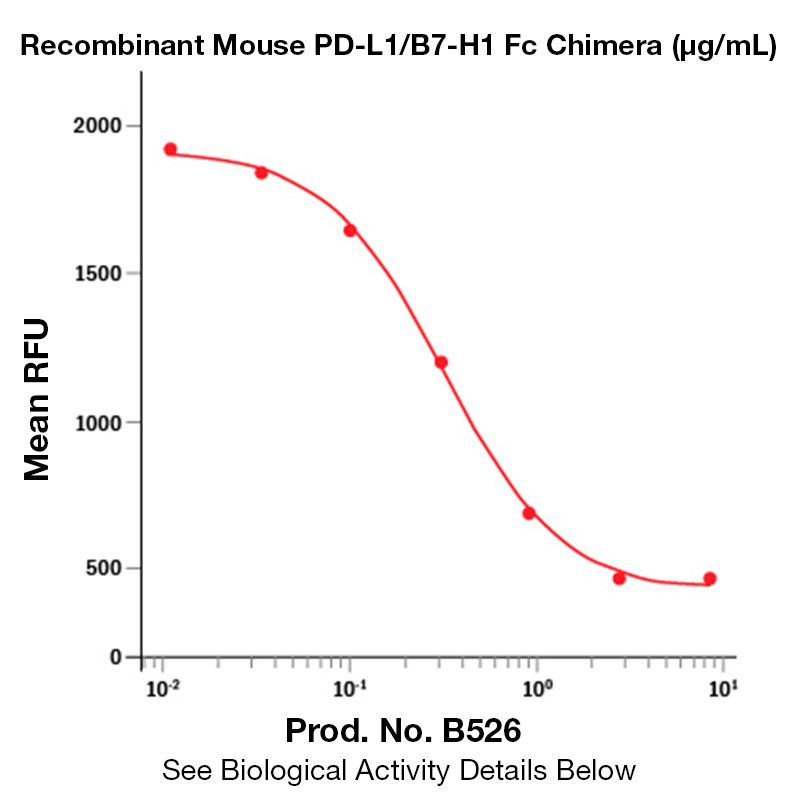Recombinant Mouse PD-L1 (B7-H1)
| Code | Size | Price |
|---|
| LEI-B526-100ug | 100 ug | £591.00 |
Quantity:
Prices exclude any Taxes / VAT
Overview
Host Type: Mouse
Regulatory Status: RUO
Shipping:
Ambient
Storage:
This lyophilized protein is stable for six to twelve months when stored desiccated at -20°C to -70°C. After aseptic reconstitution this protein may be stored at 2°C to 8°C for one month or at -20°C to -70°C in a manual defrost freezer. Avoid Repeated Freeze Thaw Cycles. See Product Insert for exact lot specific storage instructions.
Images
Further Information
Antigen Distribution:
PD-L1 is present on T cells, B cells, NK cells, dendritic cells, IFN-γ activated endothelial cells, and monocytes.
Format:
This recombinant protein was 0.2 um filtered and lyophilized from modified Dulbecco?s phosphate buffered saline (1X PBS) pH 7.2 ? 7.4 with no calcium, magnesium, or preservatives.
Formulation:
This recombinant protein was 0.2 um filtered and lyophilized from modified Dulbecco?s phosphate buffered saline (1X PBS) pH 7.2 ? 7.4 with no calcium, magnesium, or preservatives.
Long Description:
PD-1 is a 50-55 kD member of the B7 Ig superfamily. PD-1 is also a member of the extended CD28/CTLA-4 family of T cell regulators and is suspected to play a role in lymphocyte clonal selection and peripheral tolerance. The ligands of PD-1 are PD-L1 and PD-L2, and are also members of the B7 Ig superfamily. PD-1 and its ligands negatively regulate immune responses. PD-L1, or B7-Homolog 1, is a 40 kD type I transmembrane protein that has been reported to costimulate T cell growth and cytokine production. The interaction of PD-1 with its ligand PD-L1 is critical in the inhibition of T cell responses that include T cell proliferation and cytokine production. PD-L1 has increased expression in several cancers. Inhibition of the interaction between PD-1 and PD-L1 can serve as an immune checkpoint blockade by improving T-cell responses In vitro and mediating preclinical antitumor activity. Within the field of checkpoint inhibition, combination therapy using anti-PD1 in conjunction with anti-CTLA4 has significant therapeutic potential for tumor treatments. PD-L2 is a 25 kD type I transmembrane ligand of PD-1. Via PD-1, PD-L2 can serve as a coinhibitor of T cell functions. Regulation of T cell responses, including enhanced T cell proliferation and cytokine production, can result from mAbs that block the PD-L2 and PD-1 interaction.
NCBI Gene:
60533
Purity:
>90% by SDS-PAGE and analyzed by silver stain.
Target:
PD-L1
References
1. Sheppard, KA. et al. (2004) FEBS Letters 574:37
2. Flies, DB. et al. (2007) J. Immunol. 30:251
3. Yamazaki, T. et al. (2002) J. Immunol. 169:5538
4. Thompson, RH. et al. (2004) Proc. Natl. Acad. Sci. USA 101:17174
Related Products
| Product Name | Product Code | Supplier | Recombinant Human PD-L1 (B7-H1) | LEI-B530 | Leinco Technologies | Summary Details | |||||||||||||||||||||||||||||||||||||||||||||||||||||||||||||||||||||||||||||||||||||||||||||
|---|---|---|---|---|---|---|---|---|---|---|---|---|---|---|---|---|---|---|---|---|---|---|---|---|---|---|---|---|---|---|---|---|---|---|---|---|---|---|---|---|---|---|---|---|---|---|---|---|---|---|---|---|---|---|---|---|---|---|---|---|---|---|---|---|---|---|---|---|---|---|---|---|---|---|---|---|---|---|---|---|---|---|---|---|---|---|---|---|---|---|---|---|---|---|---|---|---|---|---|
| Anti-Mouse PD-L1 (CD274) | LEI-B557 | Leinco Technologies | Summary Details | ||||||||||||||||||||||||||||||||||||||||||||||||||||||||||||||||||||||||||||||||||||||||||||||||
| Anti-Human PD-L1 (B7-H1) Biotin | LEI-B605 | Leinco Technologies | Summary Details | ||||||||||||||||||||||||||||||||||||||||||||||||||||||||||||||||||||||||||||||||||||||||||||||||
| Anti-Mouse PD-L1 Antibody (Clone 10F.9G2) - Purified in vivo GOLD™ Functional Grade | LEI-P363 | Leinco Technologies | Summary Details | ||||||||||||||||||||||||||||||||||||||||||||||||||||||||||||||||||||||||||||||||||||||||||||||||
| Anti-Mouse PD-L1 - Biotin | LEI-P368 | Leinco Technologies | Summary Details | ||||||||||||||||||||||||||||||||||||||||||||||||||||||||||||||||||||||||||||||||||||||||||||||||
| Anti-Mouse PD-L1 - APC | LEI-P369 | Leinco Technologies | Summary Details | ||||||||||||||||||||||||||||||||||||||||||||||||||||||||||||||||||||||||||||||||||||||||||||||||
| Anti-Mouse PD-L1 - PE | LEI-P370 | Leinco Technologies | Summary Details | ||||||||||||||||||||||||||||||||||||||||||||||||||||||||||||||||||||||||||||||||||||||||||||||||
| Anti-Mouse PD-L1- Purified in vivo PLATINUM™ Functional Grade | LEI-P371 | Leinco Technologies | Summary Details | ||||||||||||||||||||||||||||||||||||||||||||||||||||||||||||||||||||||||||||||||||||||||||||||||



